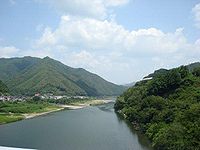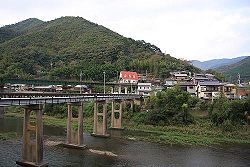
Nishitosa, Kochi
Encyclopedia

Villages of Japan
A is a local administrative unit in Japan.It is a local public body along with , , and . Geographically, a village's extent is contained within a prefecture....
located in Hata District
Hata District, Kochi
is a district located in Kōchi, Japan.As of the Shimanto merger but with 2003 population statistics, the district has an estimated population of 22,402 and a density of 59.4 persons per km²...
, Kōchi
Kochi Prefecture
is a prefecture of Japan located on the south coast of Shikoku. The capital is the city of Kōchi.- History :Prior to the Meiji Restoration, Kōchi was known as Tosa Province and was controlled by the Chosokabe clan in the Sengoku period and the Yamauchi family during the Edo period.- Geography...
, Japan
Japan
Japan is an island nation in East Asia. Located in the Pacific Ocean, it lies to the east of the Sea of Japan, China, North Korea, South Korea and Russia, stretching from the Sea of Okhotsk in the north to the East China Sea and Taiwan in the south...
.
On April 10, 2005 Nishitosa was merged the old city of Nakamura
Nakamura, Kochi
Nakamura was a city located in Kōchi, Japan. The city was in the southwestern part of Kōchi and known for its shrine.On April 10, 2005 Nakamura was merged with the village of Nishitosa, from Hata District, to form the new city of Shimanto....
, to form the new city of Shimanto.
Geography
The population of Nishitosa was 3,492 people as of May 31, 2008. The total area was 248 km² (96 sq mi). It is approximately 124 km (77 mi) from the capital city of Kōchi.Access
There is one station, Ekawasaki station, from which only local trains run. It is accessible from Ehime prefecture and the town of Shimanto by route 381 and from Nakamura via the 441. It is very difficult to reach the village without a car. It takes about 3 hours to drive to Kōchi from the village.Temperature
In the summer, the temperatures reach an average of 32 ℃ in the day and about 26 ℃ at night. In Kōchi, typhoon season lasts from July until September. In the winter, temperatures average 13 ℃ in the daytime and 5 ℃ at night. It occasionally snows in the winter and many people use kerosene heaters to keep warm.Tourism
The village is known for its beautiful views of the Shimanto river, said to be the cleanest river in Japan, and its ayu fish. Tourists flock to the village in the summer for camping and canoeing.The area is also good for firefly viewing. In June, there is a firefly festival and fireflies can be easily seen around from many of the chinkabashi bridges.
Wildlife

Education
As of 2009, there are seven elementary schools, one junior high school, one high school and three kindergartens in the village. However, due to falling student numbers the elementary schools are expected to merge into one by 2011. The junior high school, elementary schools and kindergartens are currently visited regularly by one JET English ALT (Assistant Language Teacher).External links
- Official website of Nishitosa in Japanese
- Official website of Shimanto in Japanese

